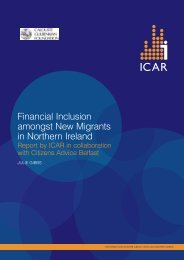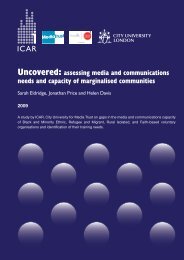The Somali community in the UK: What we know and how we ... - ICAR
The Somali community in the UK: What we know and how we ... - ICAR
The Somali community in the UK: What we know and how we ... - ICAR
You also want an ePaper? Increase the reach of your titles
YUMPU automatically turns print PDFs into web optimized ePapers that Google loves.
‘now’, after an encounter with counsell<strong>in</strong>g. Br<strong>in</strong>g<strong>in</strong>g<br />
people to <strong>the</strong> po<strong>in</strong>t of seek<strong>in</strong>g this culturally<br />
unfamiliar process is ano<strong>the</strong>r matter. Even after <strong>the</strong><br />
experience some <strong>we</strong>re negative:<br />
I do not see <strong>the</strong> benefit of talk<strong>in</strong>g to a<br />
psychiatrist about problems. I thought<br />
psychiatrists saw mad or mentally ill people.<br />
(ibid: 84)<br />
I am not sure whe<strong>the</strong>r talk<strong>in</strong>g about worries is<br />
useful to refugee people who have o<strong>the</strong>r major<br />
difficulties <strong>in</strong> adapt<strong>in</strong>g to a new country. (ibid:<br />
82)<br />
<strong>What</strong> will <strong>the</strong> specialist do to take away all <strong>the</strong><br />
problems <strong>we</strong> have? (ibid: 83)<br />
Individuals differ <strong>in</strong> <strong>the</strong>ir reaction to counsell<strong>in</strong>g<br />
- younger men <strong>and</strong> women with more exposure<br />
to <strong>we</strong>stern preoccupations with emotions <strong>and</strong><br />
relationships may be more receptive. For <strong>the</strong>ir<br />
parents, with so many practical problems to face,<br />
talk<strong>in</strong>g may seem to be beside <strong>the</strong> po<strong>in</strong>t. Yet <strong>the</strong><br />
psychological effect of daily realities is <strong>the</strong> first<br />
of two areas identified by Gabriel <strong>and</strong> Ritchie<br />
<strong>in</strong> <strong>the</strong>ir <strong>in</strong>formative overview of <strong>Somali</strong> mental<br />
health <strong>in</strong> To<strong>we</strong>r Hamlets (2002). <strong>The</strong> issues already<br />
raised <strong>in</strong> previous sections - language, hous<strong>in</strong>g<br />
(<strong>in</strong>clud<strong>in</strong>g homelessness), unemployment, racism,<br />
social benefits <strong>and</strong> poverty - all can contribute to<br />
<strong>in</strong>security <strong>and</strong> stress. 115 Uncerta<strong>in</strong>ty about leave to<br />
rema<strong>in</strong> is a major cause of anxiety, as one <strong>Somali</strong><br />
man emphasised:<br />
<strong>The</strong> government should give quick decisions for<br />
asylum seekers about <strong>the</strong>ir immigration process:<br />
<strong>the</strong> longer <strong>the</strong> decision takes, <strong>the</strong> more <strong>the</strong>y will<br />
be demoralised <strong>and</strong> pushed to drugs. <strong>The</strong> m<strong>in</strong>ds<br />
of refugees can’t be settled unless <strong>the</strong>y get a<br />
decision. (Lukes <strong>and</strong> Bell, 2002: 67)<br />
An <strong>in</strong>dividual may have a lurk<strong>in</strong>g propensity for<br />
mental <strong>in</strong>stability, <strong>and</strong> a serious practical problem<br />
may push <strong>the</strong> worrier over <strong>the</strong> edge. Difficult<br />
material circumstances also contribute to a sense<br />
of social exclusion; <strong>the</strong> experience of liv<strong>in</strong>g on<br />
<strong>the</strong> marg<strong>in</strong>s of society has profound psychological<br />
repercussions.<br />
<strong>The</strong> second, <strong>and</strong> related, area is cultural difference.<br />
Social problems are not <strong>the</strong> preserve of <strong>Somali</strong>s,<br />
but <strong>the</strong> attempt to deal with <strong>the</strong>ir effects is<br />
more successful when made by a member of <strong>the</strong><br />
<strong>community</strong>:<br />
I can only have <strong>the</strong> confidence of contact<strong>in</strong>g a<br />
specialist if <strong>the</strong>re is someone who will help with<br />
<strong>the</strong> language. Without communication you feel<br />
like <strong>the</strong> whole world is closed from you. (Farah<br />
<strong>and</strong> Smith, 1999: 84)<br />
<strong>Somali</strong> health professionals can share both<br />
<strong>the</strong> language <strong>and</strong> <strong>the</strong> client’s m<strong>in</strong>dset. <strong>The</strong>y will<br />
underst<strong>and</strong> that faced with <strong>the</strong> offer of counsell<strong>in</strong>g,<br />
<strong>Somali</strong>s want to start with discuss<strong>in</strong>g concrete<br />
concerns ra<strong>the</strong>r than <strong>the</strong>ir psychological effects.<br />
<strong>Somali</strong> practitioners have often undergone <strong>the</strong><br />
refugee experience <strong>the</strong>mselves, <strong>and</strong> ma<strong>in</strong>ta<strong>in</strong><br />
that by address<strong>in</strong>g <strong>the</strong> practical problems first,<br />
trust is established, stress reduced, <strong>and</strong> <strong>the</strong> client<br />
encouraged to ‘open up’ about <strong>the</strong>ir nightmares<br />
<strong>and</strong> po<strong>we</strong>rful emotions. Abdirashid Gulaid, a<br />
Daryeelka Maanka caseworker, f<strong>in</strong>ds that he is<br />
accepted <strong>in</strong>to <strong>Somali</strong> homes where <strong>the</strong> door has<br />
been shut on a British psychiatric nurse. 116 Yet<br />
<strong>the</strong> majority of <strong>Somali</strong>s like Abdi who work <strong>in</strong> <strong>the</strong><br />
field of health come from <strong>the</strong> voluntary sector.<br />
In statutory bodies <strong>the</strong>re are few - <strong>the</strong>re is no<br />
<strong>Somali</strong> doctor <strong>in</strong> his borough of To<strong>we</strong>r Hamlets,<br />
only three <strong>Somali</strong> health care assistants <strong>in</strong> hospitals,<br />
one counsellor <strong>and</strong> one tra<strong>in</strong>ee student. 117 This<br />
is unfortunate. Only a <strong>Somali</strong> practitioner can<br />
truly appreciate <strong>the</strong> effects of war which have<br />
touched every <strong>Somali</strong> refugee - whe<strong>the</strong>r <strong>the</strong><br />
terror of torture, rape, <strong>and</strong> <strong>the</strong> threat of death,<br />
<strong>the</strong> experience of ab<strong>and</strong>on<strong>in</strong>g home <strong>and</strong> flee<strong>in</strong>g<br />
<strong>Somali</strong>a, <strong>the</strong> grief of bereavement, or <strong>the</strong> fear for<br />
family <strong>and</strong> friends left beh<strong>in</strong>d. <strong>The</strong> war wounds <strong>and</strong><br />
physical disabilities <strong>in</strong>flicted by <strong>the</strong> war have <strong>the</strong>ir<br />
psychological equivalents. “Accord<strong>in</strong>g to a <strong>Somali</strong><br />
advocate for mental health”, writes Green (2001:<br />
26), “<strong>the</strong>re are more cases of persistent traumatic<br />
mental stress than settlement related problems<br />
among <strong>the</strong> <strong>Somali</strong> <strong>community</strong>”. Memories lock<br />
people <strong>in</strong>to <strong>the</strong> past, <strong>and</strong> rumours of current chaos<br />
generate an anxious malaise <strong>and</strong> stop <strong>the</strong>m mov<strong>in</strong>g<br />
on:<br />
56 <strong>The</strong> <strong>Somali</strong> <strong>community</strong> <strong>in</strong> <strong>the</strong> <strong>UK</strong>

















